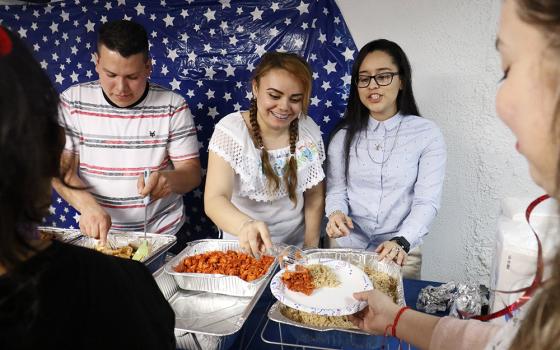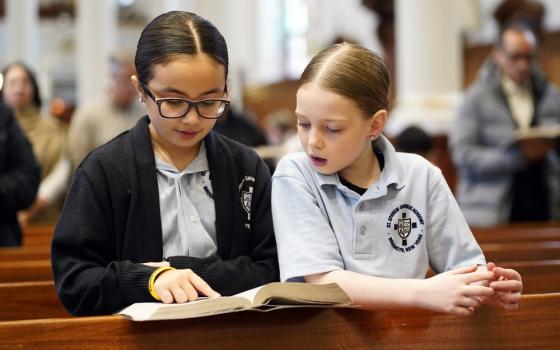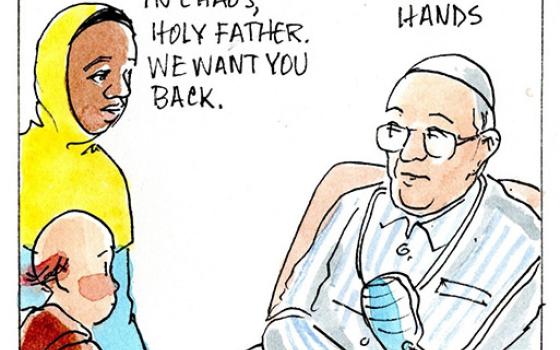Several bishops made presentations at the USCCB meeting on their different areas of competence this morning.
Bishop Kevin Farrell of Dallas, chairman of the Committee on National Collections, presented a new document, “One Church, One mission – Guidelines for Administering USCCB National Collections in Dioceses.” The new guidelines “do not create new rules,” Farrell said, but instead provide some of the history and context for the collections. He noted that the World Mission Sunday Collection is mandated by canon law, and that two, Peter’s Pence and the Holy Land Collections, are both undertaken at the request of the Holy See. The other national collections, such as the Home Missions Appeal and the Catholic Campaign for Human Development, were approved a two-third majority of the USCCB.
The new guidelines examine such issues as the retention of national collection funds by parishes or dioceses. In recent years, some bishops have declined to forward the funds collected because they disapprove of certain practices. The Catholic Campaign for Human Development has been a special target from some pro-life groups, such at the American Life League, which charges the CCHD has provided funding to organizations that do not share all of the Church’s teachings. The document also deals with the practice of combining collections. After his presentation, Bishop Farrell received no questions from the floor.
Bishop Kevin Rhoades, Chairman of the Committee on Laity, Marriage, Family Life and Youth, gave the plenary session an oral report on the work of his committee. He focused his talk on the need to promote marriage among Catholics as the most fertile way of defending marriage. He called attention to the current campaigns undertaken by the bishops, the “For Your Marriage” and “Por Tu Matrimonio” campaigns which includes radio, television and billboard advertising around the theme, “What have you done for your marriage today?” This year, they released another campaign around the theme “Marriage Takes Teamwork.” The messages help bring people to the committees website where they can find additional materials for married couples. Rhoades asked the bishops to consider putting a link on their diocesan websites. He reported over 1.7 million visits to the website to the website in its first four years of existence. The Spanish language version of the website has gotten some 300,000 visits in its two years on the web. A recent radio campaign on Spanish-language channels has vastly increased traffic to the committee’s website.
Bishop Salvatore Cordileone, who chairs the subcommittee for the Promotion and Defense of Marriage, discussed the role of public authority in the defense of marriage, which he called a “sacred duty.” He announced the launch of a new website for the subcommittee that will provide a range of resources for catechists and pastors on the subject.
The morning’s session closed with a wide-ranging speech from Bishop William Lori, head of the new ad hoc committee on religious liberty. Lori’s comments echoed his testimony before Congress two weeks ago, about which I wrote here, grounding the Church’s commitment to religious liberty in both papal and conciliar teaching as well as in the U.S. Constitution. Lori said that, “while recognizing religious freedom as an individual right, we see that religious freedom belongs also to churches and religious institutions comprised of citizens who are believers, and who seek, not to create a theocracy, but rather to be leaven and light within their culture.” I agree with Lori on this point, but think introducing the libertas ecclesiae into U.S. jurisprudence is not, in fact, suggested by anything in the Founders’ worldview. Later, Lori said, “So while religion is indeed a personal matter, it is not a private matter, for there is no religious liberty if we are not free to express our faith in the public square and if we are not free to act on that faith through works of education, healthcare and charity.” Alas, I think it is a misreading of the Founders to think they thought of religion as anything but a private matter.
Perhaps the most telling part of Lori’s speech, however, came when he delineated current threat to religious liberty. His first item on the list came not from the Obama White House but from “an Alabama law and court ruling that criminalize the ‘good Samaritan’ services which religious entities provide to the undocumented.” It is important that the USCCB understands that the religious liberty issue be fought comprehensively, and not as a partisan whipping boy, and Bishop Lori seems to grasp that by highlighting a GOP-backed measure first. The next three items he listed all had to do with some manifestation of the same-sex marriage debate which is, to my mind, insoluble. He went on to discuss the two current issues with HHS guidelines, and the two decisions by the Department of Justice that are seen as antithetical to the Church’s teaching. But, nothing in Lori’s words or tone could be construed as an “attack” on the Obama administration.



